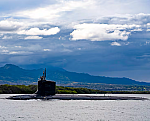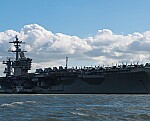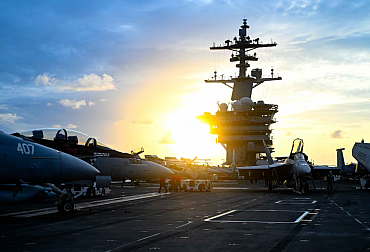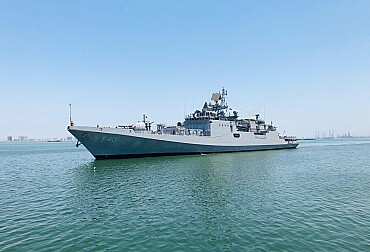U.S. Navy destroyer Mason comes to the rescue of stricken commercial ship in the Red Sea
In a dramatic rescue operation in the Red Sea, the U.S. Navy destroyer USS Mason rushed to the aid of a commercial ship that had been struck by a cruise missile on December 11. The incident occurred in the Bab-el-Mandeb strait, a crucial maritime passageway connecting the Red Sea to the Gulf of Aden. The targeted vessel, Motor Tanker STRINDA, reported damage and a resulting fire onboard, but thankfully, no casualties were reported at the time of the attack.
_steams_through_the_Atlantic_Ocean.jpg)
According to a statement from U.S. Central Command (CENTCOM), the missile that struck the STRINDA is believed to have been an Anti-Ship Cruise Missile (ASCM) fired from an area in Yemen controlled by Houthi rebels. This latest attack marks an alarming escalation in a series of assaults on private vessels navigating this economically vital sea lane. The USS Mason's timely response underscores the importance of international efforts to secure this critical maritime passage.
The USS Mason has been actively engaged in protecting civilian ships from threats in recent weeks. Alongside its counterpart, the USS Carney, the destroyer has intercepted attack drones and responded to attacks on civilian vessels. The Pentagon clarified that the downing of these drones was carried out in self-defense, although it remains uncertain whether the destroyers were the intended targets.
The attack on the Norwegian-flagged STRINDA raises concerns about the widening scope of the conflict in the region. Houthi rebels, backed by Iran, have previously targeted ships close to the Bab el-Mandeb Strait, primarily those with perceived connections to Israel. This poses a significant risk to cargo and energy shipments passing through the Suez Canal and exacerbates the international implications of the ongoing Israel-Hamas conflict in the Gaza Strip.
Although the Houthis have not yet claimed responsibility for this latest attack, Brig. Gen. Yahya Saree, a spokesperson for the rebel military, hinted at an upcoming announcement. Analysts believe that the Houthis may be attempting to bolster their diminishing popular support, a result of the prolonged civil war in Yemen.
Both France and the United States have reported Houthi drones approaching their ships, which were subsequently shot down in self-defense. However, neither nation has directly responded to these attacks. Israel, likewise, has denied any links between the targeted ships and their country.
The escalating attacks on global shipping come at a precarious time when the Israel-Hamas war threatens to escalate into a broader regional conflict. A brief truce briefly halted hostilities, leading to the exchange of hostages for Palestinian prisoners held by Israel. However, the truce's collapse and the resumption of intense Israeli ground operations and airstrikes on Gaza have heightened the risk of further attacks at sea.
This incident is not the first of its kind. In November, the Houthis seized a vehicle transport ship linked to Israel in the Red Sea off the coast of Yemen, where it remains held near the port city of Hodeida. Additionally, an Israeli billionaire's container ship fell under attack from a suspected Iranian drone in the Indian Ocean.
Amidst these escalating tensions, a fragile cease-fire between the Houthis and a Saudi-led coalition supporting Yemen's exiled government has largely held for several months. However, the prospect of a wider conflict at sea or potential reprisals from Western forces raises concerns about reigniting hostilities in Yemen, the Arab world's most impoverished nation.
In the past, the United States responded to missile attacks on its Navy ships in Houthi-controlled territory with Tomahawk cruise missile strikes in 2016, destroying three coastal radar sites.
The attack on the STRINDA underscores the need for increased vigilance in the Red Sea and the broader region, as maritime security remains a critical concern in an already volatile geopolitical landscape.










